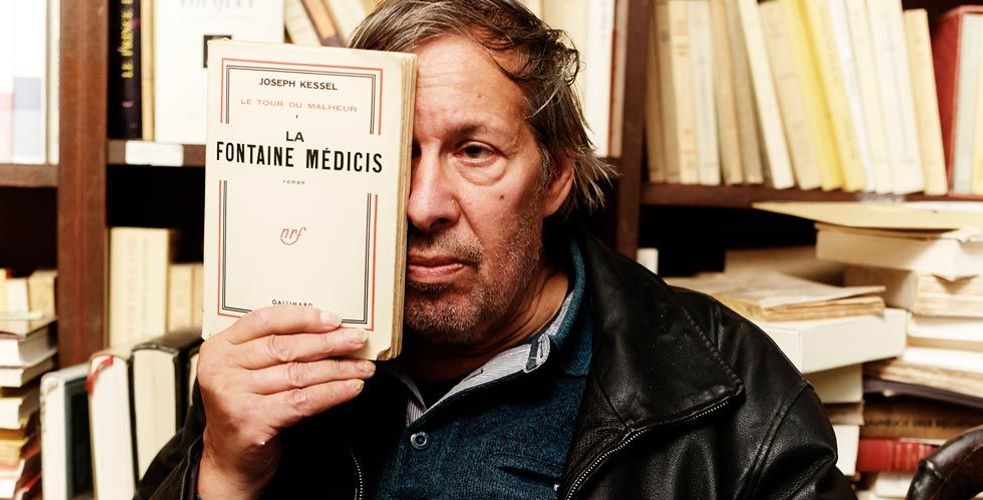The Parisian bookseller who won't sell Nobel prize winner Annie Ernaux

Hubert Bouccara is the bookseller who said no to Annie Ernaux, no to Amazon, yes to Bi-Bop, and kicked out of his shop customers whose research or reading desires didn't suit him.
Booksellers have a freedom of conscience, which they can choose not to trade in as much as they might. So when Annie Ernaux was awarded the Nobel Prize for Literature, Hubert Bouccara caused a stir by putting up a poster in front of his shop, La Rose de Java. "There's no point wasting your time asking me if I have any books by Annie Ernaux, I don't sell books by anti-Semitic, hystero-feminist, indigenist, racialist collabos and anything else that has to do with the stench of the woke! More recently, he distinguished himself by launching a petition in support of the book sellers ordered to remove their book boxes during the Olympic Games next year. Physically diminished, Hubert Bouccara remains combative against the ravages of time, and continues to hunt for bargains and look after his books, until he can devote himself entirely to writing and painting, when his retirement benefits become available. We spoke to him on rue Campagne Première (Paris 14th), where a great deal is happening, between a committed bookseller and a non-conformist bistro that is said to be frequented by the extreme right.
The petition against the removal of booksellers' boxes during the Olympic Games
I launched the petition at their request, as they're not necessarily very tech-savvy. It will soon reach 165,000 signatures, which doesn't exactly please the Town Hall. They called me the other day to tell me that they had nothing to do with it. But we've put together a text that doesn't incriminate anyone, neither the town hall nor the prefecture, and that simply mentions the need to save the secondhand booksellers.

A pioneer in online book sales
I had one of the first mobile phones, it was a bi-bop, a France Télécom phone. Every day, you had to connect to a nearby terminal, which you could spot on the guttering thanks to a symbol with blue, white and green lines. Oh look, that's bibop. You did one thing and you were connected. But these days, the phone is still a constraint, so I turn it off or I stay away from it. As for online sales, it's completely random. When I started working online in 1996-1997, I was still a bookseller on the quays of the Seine. I came across a site called livre-rare-book.com, set up by a bookseller in Lyon. He explained to me at the time how it worked. At the time, people looked at me as if I were a Martian. They'd say: "But your thing will never work! Well, except for the fact that it started off with exponential growth in the first ten years. And then there's Amazon, which is voracious - they take almost 25%. I used to sell a bit through Amazon, especially new books sent to me by press agencies. Then they started talking as if I were their employee. Obviously, I couldn't like that. So I sent them packing. One day, one of them phoned me up and said: "Yes, I need to know your holiday dates". I said, "What the hell? Who are you to ask me that? I'm not your employee. I'm getting fed up with your books and your stories. So I'm going to stop working with you on this stupid thing. No more. Curtain. These days I sell through livre-rare-book.com, which works out very well, they don't take any advertising, you have a subscription, you pay for your space just like at a fair [La Rose de Java offers some 20,000 volumes for sale on the site]. What's more, I sometimes help another bookseller who's having trouble with computers.
Annie Ernaux, unreadable
I had invented a word, not for her, but for other books and authors, like Céline's pamphlets. One day, I found two paperbacks by Ernaux in a book box in Fontainebleau. That was when I was walking. Here, I don't know her, I'll give it a try. And after twenty or thirty pages, it just fell into my head.
It's undrinkable, and for this kind of book I invented the word 'unreadable', which I claim as my own. It's navel-gazing, not literature. I said on the radio that I didn't reproach her for her literature, which is insignificant, but for being anti-Semitic. She has done crazy things, taken part in boycott campaigns against cultural events. Why boycott that? What's the point? [We mention Albert Paraz, Céline's friend and defender, and author of a preface to the founding book of negationism, Le Mensonge d'Ulysse, whose novel, L'Adorable Métisse, is on display in front of us]. I don't mind selling Paraz because he was a bit reactive but not very committed. Paul Rassinier was part of an ultra-left group called La Vieille Taupe, the first negationists in France, which had its headquarters on rue d'Ulm in the fifth arrondissement, next to Normale Sup and the Institut Curie.
Telephone harassment
No, no, no, no, I've received four or five nasty emails about Annie Ernaux, including one very insulting one, the only one I replied to. The guy thought he was insulting me by calling me a dirty Zionist. So I replied: "Read carefully, asshole. Read carefully what I write because it's important. Firstly, I'm not dirty and secondly, yes, I'm a Zionist and I piss in your face and I'll say so. But at a time when your ancestors were living in the woods, eating acorns and fighting like barbarians, my ancestors had built a civilisation. He didn't reply. He finished. And the others? It was in another slightly ironic spirit. Idiot, really stupid.
The extreme right
I used to have more stories when there was a restaurant near here, La Mère Agitée. But that's all over now, it doesn't work any more. They've been wiped out by the health crisis and so much the better, good riddance. The owner was a bit shaky - shaky seas, frankly, suited her well. She never spoke to me at local business meetings. The restaurant was reserved exclusively for right-wing extremists and some evenings you could hear stupid chants coming from the basement. Then one day I had a visit from, what's his name, that guy from Lyon University, Bruno Gollnisch. He stopped by. He came in, very polite, maybe a little too polite, almost obsequious. He said to me: "Hello sir, would it be possible to have a look at that book you have in the window? It was a huge tome on the history of the French navy by Claude Farrère that I couldn't sell. So I took the book out and said to him, "Sit down over there on the table, pull up a chair, sit back and take as long as you like. And the guy soon says, I'll take it, I say thank you, and when it's time to pay, I see his name on the card. It was Bruno Gollnisch. Alain Soral also stopped in front of the bookshop. He stood there for three or four minutes. I went up to him and asked if he'd lost anything. He left without answering, surrounded by two ruffians.
Another day, I got really angry. This was before my heart attacks, I could still afford to do it. I was getting ready to go home to a little fat guy who looks like a mollusc. I can't handle him. First of all, it's physically prohibitive. It was Jérôme Bourbon, the director of Rivarol. So he's the last, maybe one of the last guys in France who talks about Jews as a deicidal people. So I jumped from here to there and I said to him, very violently, with that nasty look I know so well: "You go back to my place, I'll tear your face off. So he left. Well, I've been a bit bored since the restaurant closed. One time someone came by and said he was looking for first editions of Brasillach. I replied that this wasn't the Kommandantur annex. I was being very mocking anyway. And one day someone slipped a piece of paper under my door. It said "fucking kike". So I made a flyer and wrote "Notice to the asshole who put that paper under my door. Asshole, that takes two -s" I didn't get any reaction, but it made the whole neighbourhood laugh.
To piss them off, I put books about the Jews, the war, the Shoah and Israel in the window. At first, that was the idea. Then, the funny thing was that it worked. First of all, I pissed them off, but what's more, I was selling these books. People were interested, not necessarily Jewish people, but everyone. I've got lots of people who don't live far from here, who come to see me. One guy used to come here a lot. He doesn't come any more, maybe he's moved. He used to come and take some from me every week. Then one day I said to him: "Are you concerned by this kind of prose? And he said, "Not like you, because you're Jewish. I said to him: "I'm not hiding from it" "No, I know, it's everywhere here. But I'm not Jewish. But I come from an anti-Semitic family and I wanted to understand why. And I ended up understanding that I came from a family of big idiots.

Holidays with Romain Gary
He had a house in Majorca, where I went with Kessel. It was the last time he spent with Jean Seberg, who was a beautiful chick after all. Gary wrote a lot of his books in English. He was a terribly intelligent man and a great friend of Kessel.
What Kessel book would you recommend?
It's a complicated question, because Kessel's body of work is extensive, with almost all good books and not a single bad title. L'Armée des ombres, Les Cavaliers, Belle de Jour, which is a book about women written in 1929. I suspect that Buñuel, who used it as a critique of the bourgeoisie, never read it. La Passante du Sans-Souci, published in 1936, the first book to denounce the concentration camps in Germany. Makhno et sa juive, about a Ukrainian anarchist who really existed, Nestor Makhno. At the time Kessel published this book, Makhno was in Paris, wanted by all the cops in Ukraine, Russia and elsewhere. He was an ataman, a Cossack leader, a dangerous and bloodthirsty guy who ended up as a fitter at Renault in Billancourt. He died in terrible pain because he had shrapnel under his skin. But before he died, he wanted to kill Kessel because of the book. He went around Paris with a gun in his hand, wanting to kill him. Well, he didn't succeed, maybe he was drunk. Kessel got the story from two of his former lieutenants in a bar on the heights of Pigalle, one of those sleazy bars that Kessel knew and where he could take me when I was a youngster, not very reassured. [Editor's note: the veracity of Kessel's story is, according to the experts, open to question ].
Matzneff?
We point to a copy of Moins de seize ans, in the window to the left of the desk]. It's something I didn't want to sell because it's a bit creepy. The title is clear... I put it in the window because people might steal it. But if someone offers me 5 or 600 euros for it, I sell it straight away. I've read the book, it's of no interest, but the collection ("L'Idée fixe") of around forty titles interests me, which is why I've added to it.
The place taken by books
I often say that I live with my books. I have so many, I don't know where to put them. At home, there's a sofa that's become a sofa-bookcase, with big photos of Kessel and the painting that Chagall gave me. But I don't know where to put them. I have a friend who lives deep in the Val d'Oise. In the main room of his house, he has stackable plastic crates that go from floor to ceiling. You have to get between the stacks, 80,000 volumes of them. For him, it's the worst.
Audiobooks
I read some when I was in hospital, after my heart attack, and then for my broken hip. What I didn't know was that I had audio books in my phone. And I discovered Mary Shelley's Frankenstein and Bram Stoker's Dracula, which I'd never read. Mary Shelley's work was extraordinary for its time, very innovative. In 1818, when she wrote it, she was 27 years old. It's astonishing all the same. So I discovered this magical function, where it's not up to me to read, but it's the other person who speaks, and I listen. And there it was, on the hospital pedestal table, with my bottle of water and my yoghurt, and it was talking. Then I asked a friend to buy them for me: "These two titles, you're looking for them, I need to read them in a more traditional way". The sensations, impressions and images are not necessarily the same, but I don't mind. I don't do that, it would be sawing off the branch I'm sitting on and I've got enough to keep my windows stocked for a long time to come. But not for too long, because I'd like to stop. In fact, I've got a hankering for idleness. What I really want is to do nothing. That's a bit wrong, because I know I won't be able to do nothing. I'm going to go hunting, I'm going to walk, if I manage to get back my mobility, and then I'm going to paint. Maybe that's enough to keep you from getting bored while you're waiting for the final shock, eh?
* La mère agitée, 21 rue Campagne Première, is now closed. Figaro Scope describes this restaurant as a "non-conformist bistro" where they assure you you'll find the best pig's head in the world. Behind the humour is Valérie Delahaye, a talented chef who cooks with passion and intelligence (...) In short, it's good value for money.







